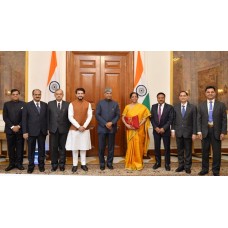MSMEs Rs 5 Crore audit free announced!
Significant tax relief to start-ups!
Increased limit to apply only to Businesses carring out less than 5% of their business transactions in cash significant tax relief to start-ups!
In order to reduce the compliance burden on small retailers, traders, shop keepers who comprise the Medium, Small and Micro Enterprise (MSME) sector, the Union Budget proposed to raise by five times the turnover threshold for audit from the existing Rs. 1 crore to Rs. 5 crore.
While presenting the Union Budget 2020-21 in Parliament, the Union Minister for Finance & Corporate Affairs, Smt Nirmala Sitharaman said that in order to boost less cash economy, the increased limit shall apply only to those businesses which carry out less than 5% of their business transactions in cash.
Currently, businesses having turnover of more than Rs 1 crore are required to get their books of accounts audited by an accountant.
In order to give a boost to the start-up ecosystem, the Union Budget has proposed to ease the burden of taxation on the employees by deferring the tax payment on ESOPs by five years or till they leave the company or when they sell their shares, whichever is earlier.
The Finance Minister said that Start-ups have emerged as engines of growth for Indian economy. Over the past year, the Government has taken several measures to handhold them and support their growth. During their formative years, Start-ups generally use Employee Stock Option Plan (ESOP) to attract and retain highly talented employees.
ESOP is a significant component of compensation for these employees. Currently, ESOPs are taxable as perquisites at the time of exercise. This leads to cash-flow problem for the employees who do not sell the shares immediately and continue to hold the same for the long-term.
Further, an eligible Start-up having turnover upto Rs 25 crores is allowed deduction of 100% of its profits for three consecutive assessment years out of seven years if the total turnover does not exceed Rs 25 crores. In order to extend this benefit to larger start-ups, the Budget has proposed to extend the turnover limit from existing Rs 25 crores to Rs 100 crores.
Moreover considering the fact that in the initial years, a start-up may not have adequate profit to avail this deduction, the Budget proposes to extend the period of eligibility for claim of deduction from the existing 7 years to 10 years.
Major Reforms Proposed in GST:
Simplified GST Return to be implemented from 1st April, 2020 to weed out Dummy or Non-Existent Units Aadhaar Based Verification of Taxpayers to be introduced Dynamic QR-Code proposed for Consumer Invoices
A simplified GST return will be implemented from the 1st April, 2020.
While presenting the Union Budget 2020-21 in Parliament today, the Union Minister for Finance & Corporate Affairs, Smt Nirmala Sitharaman said that this is under pilot run. It will make return filing simple with features like SMS based filing for nil return, return pre-filling, improved input tax credit flow and overall simplification. The Finance Minister said that the refund process has been simplified and has been made fully automated with no human interface.
Smt Sitharaman said that several measures have been taken for improving compliance and Aadhaar based verification of taxpayers is being introduced. This will help in weeding out dummy or non-existent units, she added. The Union Budget has proposed Dynamic QR-code for consumer invoices.
The GST parameters will be captured when payment for purchases is made through the QR-code. A system of cash reward is envisaged to incentivise customers to seek invoice, the Finance Minister said. Invoice and input tax credit matching is being done wherein returns having mismatch of more than 10% or above a threshold are identified and pursued.
Electronic invoice is another innovation wherein critical information shall be captured electronically in a centralized system. It will be implemented in a phased manner starting from this month itself on optional basis. It will facilitate compliance and return filing, the Finance Minister said.




